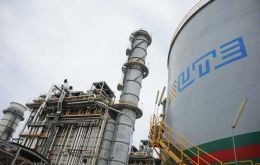MercoPress. South Atlantic News Agency
Energy & Oil
-
Saturday, December 27th 2025 - 10:23 UTC
Panama to sanction tankers intercepted by US

The Government of Panama will take disciplinary action against several oil tankers registered under its flag targeted by the United States for alleged irregularities, Foreign Minister Javier Martínez-Acha announced Friday. These vessels “failed to respect Panamanian maritime legislation,” he explained.
-
Wednesday, December 24th 2025 - 11:05 UTC
Oil prices surge amid US-Venezuela standoff

International oil benchmarks posted modest gains on Tuesday as the market entered a holiday-shortened week. Investors remained focused on the escalating geopolitical friction between Washington and Caracas, which has introduced a risk premium into an otherwise oversupplied market.
-
Tuesday, December 23rd 2025 - 10:58 UTC
General strike cripples Bolivia over so-called “Gasolinazo”

Thousands of miners, coca growers, and labor activists descended on the seat of government on Monday, marking the first day of a national general strike against Bolivian President Rodrigo Paz Pereira's decision to terminate fuel subsidies. The mobilization, led by the Bolivian Workers' Union (COB), has effectively paralyzed the capital and several other major departments.
-
Monday, December 22nd 2025 - 10:34 UTC
Venezuela: Chevron tanker departs for Texas

The Canopus Voyager, a tanker operated by US energy giant Chevron, departed Venezuelan waters on Sunday carrying 500,000 barrels of crude oil destined for Texas. The shipment proceeds despite an aggressive campaign by the President Donald Trump administration to intercept Venezuelan oil exports in international waters.
-
Monday, December 22nd 2025 - 10:08 UTC
Uruguay and HIF reach agreement for green hydrogen complex

The Government of Uruguay and the multinational firm HIF Global have signed a Memorandum of Understanding (MoU) to develop a synthetic fuels project in the department (province) of Paysandú, representing a record-breaking investment of over US$5.3 billion.
-
Friday, December 19th 2025 - 09:02 UTC
Argentine gas brings relief to electricity generation in Uruguay

Uruguay's state-owned electricity company UTE (technically the Administración Nacional de Usinas y Transmisiones Eléctricas) announced this week that importing gas from neighboring Argentina has resulted in savings of around US$3 million in the first seven days.
-
Thursday, December 18th 2025 - 08:11 UTC
Bolivian President ends fuel subsidies, raises minimum wage

Bolivian President Rodrigo Paz Pereira has announced a drastic economic overhaul, declaring a state of “economic, financial, energetic, and social emergency,” which includes ending fuel subsidies that have been in place for over 20 years and implementing a significant increase in the minimum wage to offset the resulting inflation.
-
Wednesday, December 17th 2025 - 21:23 UTC
Venezuela's PDVSA vows to continue global oil exports

Venezuela’s state-owned oil company PDVSA declared Wednesday that its export operations remain fully functional, signaling a defiant stance against a newly announced naval blockade by US President Donald Trump.
-
Wednesday, December 17th 2025 - 11:18 UTC
Trump orders total blockade of Venezuela's tankers

US President Donald Trump ordered on Tuesday a “total and complete” naval blockade of all sanctioned oil tankers traveling to and from Venezuela, marking the most aggressive move against Caracas' energy sector to date. The announcement came after the recent seizure of a sanctioned vessel.
-
Friday, December 12th 2025 - 10:50 UTC
Argentina rejects UK and Israeli oil plans for Malvinas

Argentina's Foreign Ministry on Thursday issued a vigorous rejection of a reported “Final Investment Decision” by British company Rockhopper Exploration Plc and Israel's Navitas Petroleum Development and Production Limited regarding the “Sea Lion” oil field in the North Falkland Basin.
